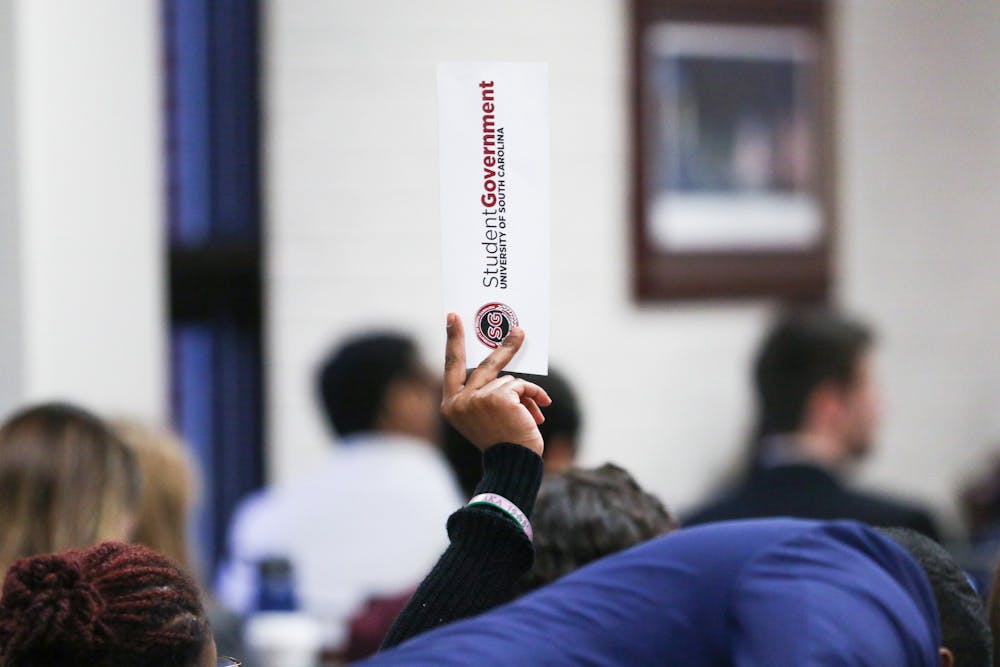A constitutional challenge took center stage at the Feb. 12 student senate meeting and a referendum was voted down.
SBL 111 91, a proposed bill that would have made the treasurer position a position appointed by the student body president instead of an elected position, was voted unfavorable by all committees. The bill stated it would "amend the structure and function of the office of the student body treasurer."
The referendum was voted on with five yes, 35 no and two abstentions.
Later, speaker pro tempore Brandon Patrick read elections commission chair Bennet Lunn’s remarks on the matter of former Speaker of the Student Senate Patrick Ellis, and how Speaker of the Student Senate Davis Latham’s alleged “undue influence” prevented Ellis from being placed onto the elections commission.
Patrick sought the floor after a motion to give Lunn the ability to give the remarks himself was denied by the senate.
According to the remarks read, the “undue influence” has kept Ellis from being put on the elections commission, and in doing so has broken the Student Government codes disallowing undue influence.
Ellis would also have been the sixth member of a currently five member elections commission. The elections commission needs at least six members, according to the Student Government codes. According to Lunn, there is "nothing" to suggest Ellis "has nefarious intent in his attempts to join the commission."
"I believe that Mr. Ellis would make a competent and viable addition to the election commission, and I believe a vote should be taken by this senate to consider him for a position on the commission,” Patrick said.
On the topic of “concerns about [Ellis'] character,” Lunn said decisions related to any violations are made as a committee. Ellis serves “at the pleasure” of Student Body President Luke Rankin, who would appoint and can dismiss him from the council at any time.
Chairman Patrick Greene and the judiciary committee found Ellis to be “not fit to be appointed to the position they were nominated,” a seat on the elections commission, for numerous reasons.
The judiciary committee attempted to set up an interview with Ellis to determine him fit to join the elections commission.The injunction that did not allow the Powers and Responsibilities and Judiciary committee to interview Ellis had not been lifted before Ellis left Columbia. Ellis was emailed to schedule an interview at 10:27 a.m. on Saturday, Feb. 8 and responded at 6:33 p.m.
Ellis was unable to interview for an elections commission position on Feb. 9. The interviewed was not rescheduled. "I was then told by Chairman Greene via email on Sunday morning they would be unable to interview," Ellis said in an email.
According to section 2-3-200 H of the Student Government codes, the judiciary committee is not allowed to interview potential candidates unless at least four members are present during the interview.
"There was not a time, between Sunday at midnight and this meeting, that four people were going to be able to get together,” Greene said. “He reached out and offered to do it via Skype, but we don't conduct interviews that way, 'cause we've got problems with whether or not that actually counts as being present and stuff like that.”
Greene said Ellis was “not an ordinary or typical nominee,” citing Ellis’ previous application and rejection to the position of election commissioner.
Greene also said that during his interview for election commissioner, Ellis took issue with a piece of legislation that would change the elections commission, which Ellis was applying for at the time, and violate the Student Government codes.
“This unprecedented action, along with the views and opinions he expressed in his brief during the trial and during his first interview, was more than sufficient for the judiciary committee to conclude that nominee Ellis is not fit to serve as a member of the elections commission,” Greene said.
Patrick motioned then to confirm Ellis to the elections commission, which required a two-thirds vote to pass. The motion was killed with zero yes, 39 no and four abstentions.
Latham said the constitutional challenge was “immature,” and his “time is being distracted by this, and I would like to move on.”
“I have loved my term, I will continue to do my term, I will continue to support you until the last day I’m in office,” Latham said.
Correction Feb. 13 at 9:14 a.m. - A previous version of the article incorrectly stated the vote count for the motion to confirm Ellis.
Updated Feb. 13 at 9:14 a.m. - Additional information about the timeline for scheduling an interview with Ellis was added.

